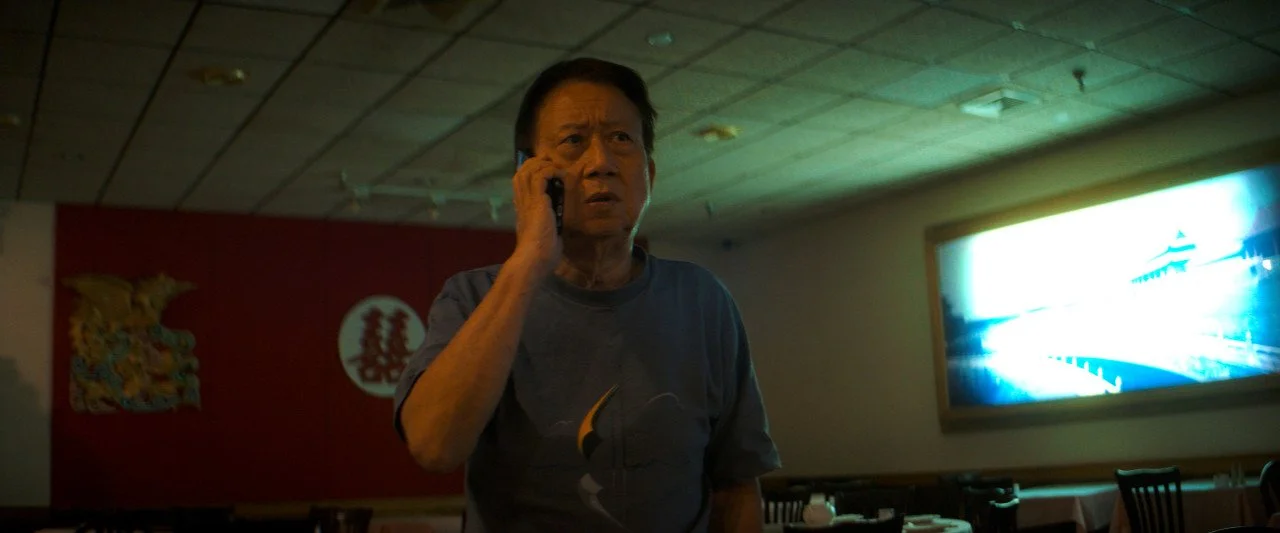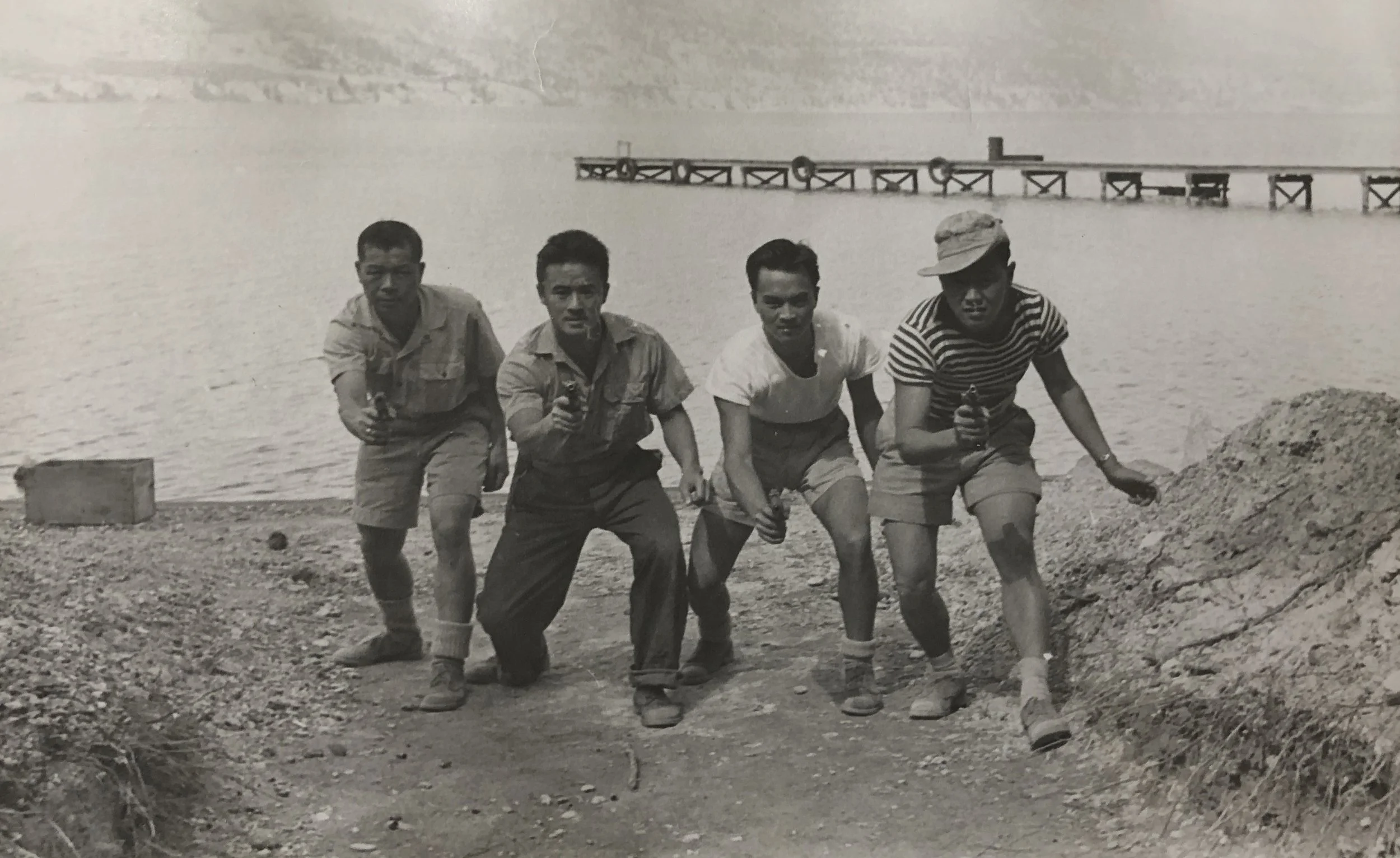Reel Asian Film Festival: Scammers, Robocalls, Drag Queens, Samurais and Sewage
By Liam Lacey
Though not a big festival, the Toronto Reel Asian International Film Festival — which starts Wednesday (November 8) and runs to November 19 — can be splendidly eclectic.
Included in this year’s 15 feature films is a docudrama hybrid about a Florida senior who falls for a Chinese scam phone call; a Singapore drag queen whose costumes are sewed by his 90-year-old granny; and the story of a Second World War Chinese Canadian secret military unit. Not to outdone is la pièce de résistance, a Japanese samurai rom-com set against a background of 19th-century sewage recycling.
A scene from Starring Jerry as Himself.
The festival, which also includes 57 shorts and three multimedia exhibits, screens at Hot Docs Ted Rogers Cinema, TIFF Bell Lightbox, and the University of Toronto’s Innis Town Hall. The program can be accessed here, and the online box office here. Here are some highlights:
Opening night is The Queen of My Dreams, the first feature from Canadian-born Fawzia Mirza, a self-described “lesbian, Muslim, Pakistani, actor, activist, writer, producer, lawyer and creature of passion.”
The film, which premiered in the Discovery program at this year’s TIFF, follows Azara, a queer grad student from Toronto who travels back to Karachi for her father’s funeral and reunion with her estranged conservative mother, Mariam.
Separate timelines follow Azra’s childhood in Nova Scotia, and a backstory of her mother in Karachi in the late sixties. The Hollywood Reporter dubbed The Queen of My Dreams a charming debut “bursting with creative energy and distinctive aesthetic sensibilities.” It screens November 8, 7:30 pm, at the Hot Docs Ted Rogers Cinema.
How do you deal with a sexual abuser in the family? In Chloe Abrahams’s documentary, The Taste of Mango, the Sri-Lankan-English filmmaker uses home video footage to talk to her mother and grandmother about the family history of abuse. Mango was picked as a documentary highlight of the BFI London Fest with the London Evening Standard called it “a bittersweet and frank look at intergenerational abuse.” It screens November 9, 5:30 pm at the TIFF Bell Lightbox.
Not for the squeamish or even the polite, Sakamoto Junji’s Okiku and the World is set in the late Edo period (1603-1868), an era when, a preface text tells us, “The country had gone to shit” as frequent images of dark pools of sludge confirm, though mercifully, it’s shot in digital black and white.
Yasuke and his helper, Chunji are lowly “manure men,” making their living collecting waste from tenement toilets and selling it to farmers for fertilizer. Yasuke is attracted a woman schoolteacher, Okiku (Haru Kuroki), the daughter of a noble, if disgraced, samurai. When Okiku loses her father in an assassin’s attack that leaves her mute, she become more available.
The characters mull over issues of class differences, recycling, and bowel movements between scenes of scooping and shovelling. Chapter headings through the film evoke both the ridiculous (the Farrelly Brothers’ Dumb and Dumber) and the sublime (Yasijuro Ozu’s 1949 father-daughter masterpiece, Late Spring). It screens November 9, 8 pm, at the TIFF Bell Lightbox.
Small Fry protagonist Kim Howon took a best actor award at South Korea’s South Korea’s Jeonju International Film Festival earlier this year for his role as a middle-aging unsuccessful actor, Ho Joon, eking out a living as YouTube carp fisherman in Joongha Park’s debut film.
One day at the lake, where he’s trying to show off his angling prowess, he has an argument with another man, who turns out to be an indie film director. The director is soon joined by an actress who wants to talk over a script with him. What follows is a wry, David Mamet-style drama, with revelations, power shifts and many fishing metaphors among the three people on the margins of the film business, making compromises between art and careerism. It screens November 10, 5:30 pm, at the TIFF Bell Lightbox.
In Flames comes with some strong buzz as a selection at the Directors Fortnight sidebar in Cannes, and as Pakistan’s submission to the Oscars. The feature debut of Pakistani Canadian director Zarah Khan is a psychological thriller.
The story follows a Mariam (Ramessha Nawal), a medical student who lives in a Karachi apartment with her indebted widowed mother and younger brother. Shifting between social pitfalls — debt, predatory men, accidents, mental illness — and ghostly visitations, the film is described by Indiewire as “a Kafkaesque saga of niceties gone awry.” It screens November 10, 8 pm, at the TIFF Bell Lightbox.
The crowd-pleasing hybrid documentary Starring Jerry as Himself starts with one of those Chinese scam robocalls that most of us erase and block the number. But to Jerry Hsu, a Taiwanese immigrant and divorced dad of three grown sons living in Orlando, Florida, it sounded legitimate and, on threat of deportation, found himself apparently cooperating with the Chinese police as an undercover agent to bust an international money-laundering scheme.
Made up mostly of reenactments, director Law Chen’s film is an entertaining and poignant genre mashup, as indicated by its trio of awards at Slamdance Festival: best documentary, audience prize for documentary and best actor for Jerry Hsu. It screens November 11, 2:30 pm, at the TIFF Bell Lightbox.
Jude Chebab’s thought-provoking documentary Q is about her Lebanese family, and her mother and grandmother’s involvement with a conservative Islamic revival women’s organization, the Qubaysiat, which was founded by the mysterious Sheykha Munira al-Qubaysi, known to her followers as al-Anisa (the teacher), who died last year at the age of 89.
The film isn’t an exposé of cult indoctrination but a meditation on submission and empowerment, or what the filmmaker has called an “affair of the spirit,” and the ripples of pain it sent through her family. Chebab’s mother Hiba, describes how she felt loved and elevated by her experience of sisterhood, and bereft when she was excommunicated. The hurt is extended to Chebab’s father, who felt emotionally betrayed by his wife’s spiritual affair. It screens November 2, 5 pm, at the TIFF Bell Lightbox.
Seagrass, a layered family drama that’s the feature film debut of writer-director Meredith Hama-Brown, won the International Critics prize at this year’s TIFF. Set in 1994 before people talked about racial micro-aggressions, it stars Ally Maki as Judith, a Japanese Canadian woman grieving for her late mother, with Luke Roberts as Steve, her obtuse white husband, who earns some sympathy because group couples therapy is obviously so embarrassing.
On the retreat, they befriend another mixed-race couple (Chris Pang and Sarah Gadon), and things start to get emotionally complicated. In this layered family study, the film divides its point-of-view between the experiences of Judith and Steve, and their two daughters, 11 and six, who are left unsupervised, with the precarious business of fitting in. It screens November 12, 5 pm, at the TIFF Bell Lightbox.
Relics of Love and War.
Veteran Toronto filmmaker Keith Lock, whose work has included experimental and narrative drama, offers the straightforward and compelling documentary, Relics of Love and War, about his immigrant family’s background and a stirring war story that isn’t part of official military histories.
Using archival materials and voiceover, Lock tells the story of his father, Tom, who was part of a group of 14 Chinese Canadians recruited by the British Special Operations Executive (SOE) for clandestine operations in the Pacific against the Japanese, who trained in a secret location on Okanagan Lake. Lock’s narrative is filled with intriguing detours and details (the recruiting colonel was a pretend military man), as it quietly reminds us about people who didn’t yet have the right to vote were ready to die for their country to prove their loyalty. It screens November 14, 7 pm, at Innis Town Hall.
Shot in 2020 before Singapore decriminalized same sex relationships, Lei Yuan Bin’s tender documentary Baby Queen follows willowy drag star Opera Tang, a.k.a. Tang Xi Er, whose elaborate costumes are made by his 90-year-old granny. Mixing performance sequences, along with scenes with the star’s boyfriend, and warm family moments, the film leads us to Opera’s change to a new costume, as he prepares for mandatory military service. It screens November 15, 7 pm, at Innis Town Hall.




